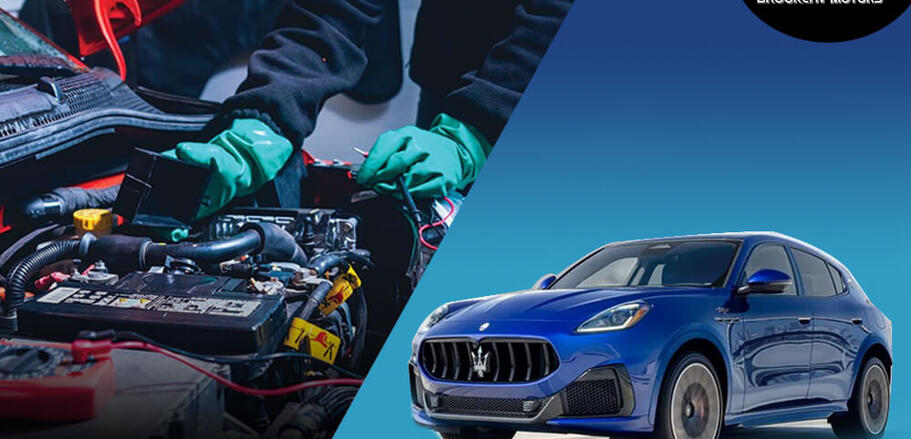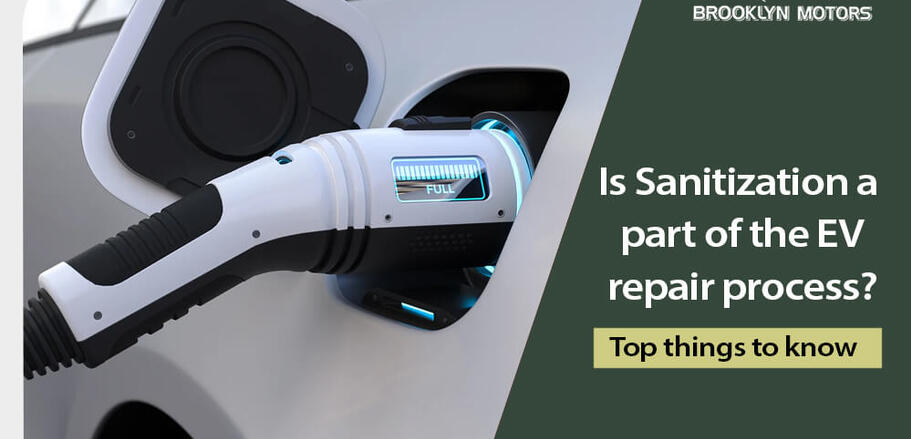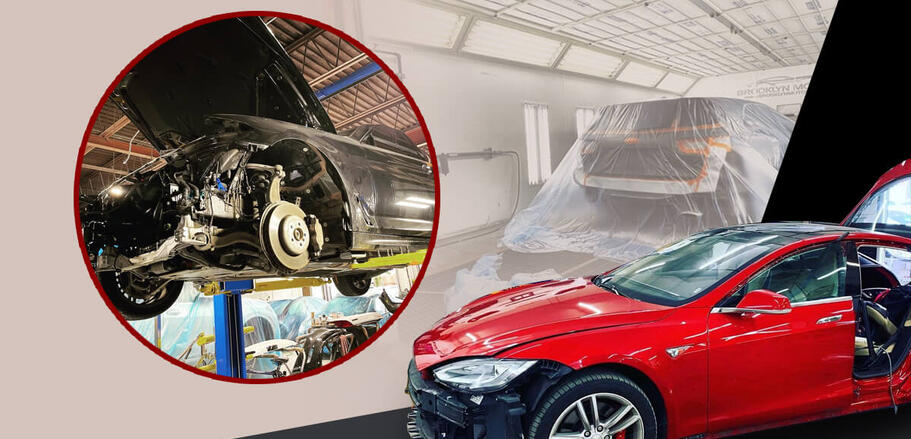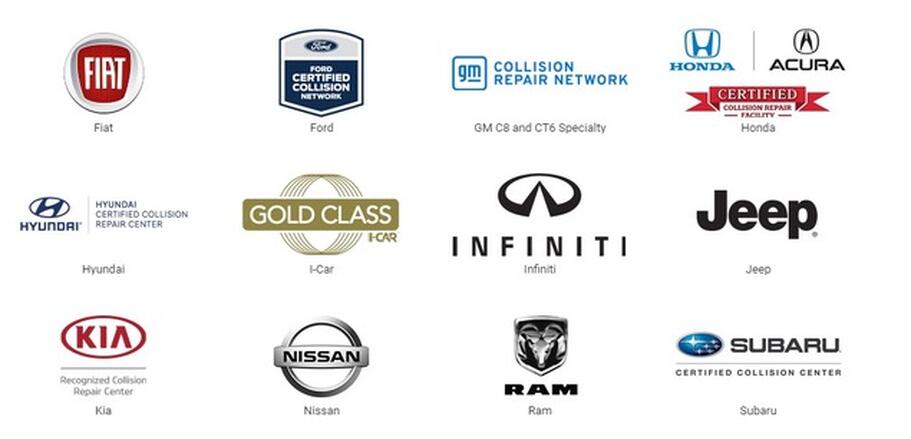
 June 17, 2024
June 17, 2024As electric vehicles (EVs) continue to surge in popularity, owners need to understand that routine maintenance and servicing are still required – it just looks a bit different from a traditional gas-powered car. Let's explore some of the key components involved in keeping your EV running smoothly with electric car servicing New York.
The Battery Pack Inspection
Since the battery pack is the literal heart powering your electric ride, it gets special attention during service. Technicians will thoroughly inspect the high-voltage battery system, checking for any signs of damage, degradation, or loss of efficiency and range over time.
Diagnostic scans ensure the battery management system is functioning optimally. In some cases, maintenance may involve re-balancing individual cell levels or even replacing modules within the pack if needed. It's a meticulous process at the electric car repair shop in New York to preserve your EV's most precious component.
Brake and Tire Services
While EVs ditch the traditional engine oil and transmission fluid changes, the brake system still requires regular attention. Brake pads, discs/rotors, and hydraulic fluid levels will be inspected and components replaced as needed, just like a gas car.
Tires are also a big focus. The increased weight of those heavy battery packs can accelerate tire wear, so rotation, balancing, and reviewing the tread life are always prudent during service visits.
Cooling System Upkeep
Electric cars rely on liquid cooling systems to keep the battery pack, power electronics, and motor from overheating during operation. Just like a gas vehicle's radiator coolant, this specialized fluid needs periodic draining, flushing, and replacement to maintain peak efficiency.
The cooling pumps, hoses, and other components will also get a thorough diagnostic inspection to ensure no leaks or failures are brewing that could lead to overheating issues down the road.
Body and Chassis Care
Of course, all the same, traditional inspections and maintenance apply to the non-electric portions of your EV's body and chassis as well. Suspension system checks, steering and alignment adjustments, windshield wiper replacement, lighting functionality tests, cabin air filter replacements, and more.
Technicians will also scan for any fault codes related to the electric power steering, traction control, anti-lock brakes, and vehicle control modules to catch any issues early. No stone is left unturned!
The EV Expertise Factor
While many service basics carry over, there's no substitute for having your EV serviced by experienced technicians who've received specialized training in electric vehicle systems from the manufacturer. They know the inner workings and unique needs of your specific EV model inside and out.
So don't skip out on service just because it's an electric car. With the right expertise and some key inspections, you can keep that green ride purring like a... ultra-quiet, zero-emissions vehicle for years to come!

 March 28, 2024
March 28, 2024We're all familiar with the importance of keeping the insides of our gas-powered cars clean. From vacuuming up crumbs to wiping down surfaces, basic interior detailing helps vehicles stay fresh. But what about electric vehicles (EVs) - do they require any special sanitization during repair or maintenance work?
Understanding high-voltage components
One key distinction with EVs is the presence of high-voltage components like the large traction battery pack and connections to the electric motor. While not necessarily "dirty" in the traditional sense, these components do require specific safety protocols during repair situations.
Isolating the high-voltage system
Whenever an EV repair technician needs to access the high-voltage system, rigorous isolation procedures must be followed. This involves safely deactivating the high-voltage circuitry and ensuring no lingering electrical potential. Only after this process can sanitization or other work commence.
Sanitizing workspaces and components
In addition to the high-voltage components themselves, the areas around where repairs take place need to be kept clean too. Maintenance technicians for EV specialized auto body shop near me will thoroughly clean repair benches, tools, carts, and anything else involved with disassembly. Components like battery packs may be sanitized before reassembly as well.
Cleaning and detailing the interior
Just like a gas car, the interior cabin areas of an EV can accumulate dirt, debris, stains, and odors over time. During major repair work involving removing large components, it's common practice to thoroughly clean and detail the exposed interior areas too. Vacuuming, steaming, shampooing – the complete detailing regimen.
Sanitization for electric powertrains and motors
While there's no exhaust system or typical "engine bay" to clean, electric motors and surrounding components still require periodic sanitization. Repair shops for EV car repair near me use specialized degreasers, cleaning solutions, and tools to ensure these areas stay shipshape.
Taking sanitization seriously
Overall, certified repair facilities do incorporate comprehensive sanitization practices into their EV repair and maintenance protocols. Given the complex high-voltage systems involved, keeping everything scrupulously clean is of paramount importance for safety and longevity.
The next time you bring your electric vehicle in for service, you can feel confident that expert-level sanitization will be part of the process. After all, today's EVs are marvels of cutting-edge technology deserving of a spotless repair environment!

 January 22, 2024
January 22, 2024With the rise of EVs, collision centers are presented with the challenge of repairing advanced automobiles. Electric vehicles are designed with a sophisticated battery system, employing advanced materials and intricate electronics that require specific methods to perform the necessary repairs economically and safely. Let’s explore some of the main repair methods utilized by electric car collision centers to transform these cars back into prime condition after an accident.
Battery inspection and diagnostics
The most essential part of an electric car is its battery. After an accident, it is necessary to determine what effect the crash had on this vital part. Electric car collision centers utilize modern diagnostic equipment for assessing the battery system's integrity. This entails verifying hidden damages and maintaining the integrity of the battery’s structure.
Specialized training for technicians
Electric vehicles require a specialized skill set and knowledge for repair. Electric car collision centers do train technicians in specialized training programs that allow them to comprehend the differences between EV systems and others. This involves education about dealing with high-voltage parts, safety guidelines, and knowledge of electric propulsion systems for accurate analysis and maintenance.
Aluminum repair expertise
Light aluminum frames are a common feature of electric vehicles to compensate for the battery weight. Repairing aluminum needs some special methods and equipment. Electric car collision centers invest in aluminum repair skills, which can handle dents, cracks, or structural damages on time. An electric car collision center NYC guarantees that the vehicle’s initial structure is preserved.
Computerized diagnostics and calibration
Electric cars are provided with advanced computer systems, which take care of diverse functions such as safety measures, sensors, and self-driving features. After an accident, these systems may need to be re-calibrated to work properly. Specialized diagnostic equipment has been developed by the collision centers for electric cars that include system checks and recalibrations.
Electric car collision centers use different specialized methodologies to tackle the challenges of electric cars. EV owners can rest assured that after a collision, their vehicles are still safe, efficient, and aesthetically pleasing thanks to the service of an electric car repair shop in New York.

 November 29, 2023
November 29, 2023In the aftermath of a collision, one faces a myriad of decisions, and among them, choosing the right auto body repair shop is paramount. The automotive industry is teeming with repair facilities, but not all are created equal. Time to shed light on the critical importance of selecting a certified repair shop to restore your vehicle to its pre-accident glory.
Precision and Expertise:
Certified repair shops boast technicians who have undergone rigorous training and certification processes. These professionals are well-versed in the latest repair techniques, technologies, and industry standards. Choosing a certified shop ensures that your vehicle will be handled by experts who understand the intricacies of modern automobile construction, from advanced materials to complex safety systems.
Quality Assurance:
Certified repair facilities are held to stringent quality standards set by the industry and manufacturers. When you entrust your vehicle to a certified shop, you are essentially guaranteeing a level of excellence in both workmanship and materials. This commitment to quality ensures that your car not only looks good on the outside but also maintains its structural integrity and safety features.
Access to Genuine Parts:
Certified repair shops have established relationships with manufacturers, granting them access to genuine OEM (Original Equipment Manufacturer) parts. Using original parts is crucial for maintaining the performance, safety, and value of your vehicle. Unlike aftermarket parts, OEM components are designed to meet the exact specifications of your car, ensuring a seamless fit and optimal functionality.
Advanced Technology and Equipment:
The automotive industry is continually evolving, introducing new materials and technologies. Certified repair shops invest in state-of-the-art equipment and stay abreast of the latest advancements. From precision frame straightening to advanced paint matching systems, these facilities are equipped to handle the complexities of modern vehicles, guaranteeing a comprehensive and accurate repair process.
Protecting Your Investment:
Your vehicle is a significant investment, and maintaining its value is crucial. Opting for a certified repair shop not only ensures a high-quality repair but also safeguards the resale value of your car. A certified repair, backed by a warranty, provides peace of mind, demonstrating the confidence that both the repair shop and the manufacturer have in the work performed.
IN CONCLUSION:
In the aftermath of a collision, the choice of an auto body repair shop holds immense weight. By opting for a certified repair facility, you are not just fixing your vehicle; you are investing in the expertise, quality, and integrity that will keep your car on the road, looking and performing as it should. The extra effort in selecting a certified shop pays off in the long run, ensuring that your vehicle receives the care and attention it deserves after an unfortunate collision.
 2575 Stillwell Ave,
2575 Stillwell Ave, 






